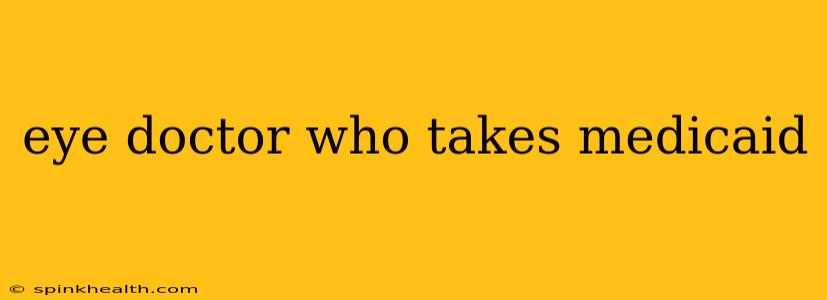Finding an Eye Doctor Who Accepts Medicaid: A Story of Clear Vision
The world swam before Sarah's eyes. Blurry street signs, faces melting into indistinct shapes – it was becoming increasingly difficult to navigate her daily life. She knew she needed to see an eye doctor, but a looming financial hurdle loomed larger than the blurry vision itself: she relied on Medicaid. Finding an eye doctor who accepts Medicaid felt like searching for a needle in a haystack. This is a common struggle for many, and finding the right care shouldn't be a battle. Let's explore how to navigate this challenge and find the clear vision you deserve.
This story isn't just about Sarah; it’s about millions facing the same predicament. Access to quality healthcare is crucial, and vision care is no exception. But navigating the maze of insurance coverage can feel overwhelming. So, let's break down how to find an eye doctor who accepts Medicaid and get you on the path to clearer vision.
How to Find an Eye Doctor Who Accepts Medicaid?
The journey to find an eye doctor who accepts Medicaid begins with a few strategic steps. First, you can harness the power of online search engines like Google, Bing, or DuckDuckGo. Simply type in "eye doctor near me Medicaid" or "Medicaid eye doctor [your city/state]". This often yields a list of ophthalmologists and optometrists within your area who participate in the Medicaid program.
But online searches aren't the only tool in your arsenal. Your state's Medicaid office is an invaluable resource. Their website usually has a provider directory that allows you to search for ophthalmologists and optometrists within your network. This directory is often more accurate than relying solely on online search engines, as it's directly sourced from the Medicaid program itself.
Finally, don't underestimate the power of word-of-mouth. Talk to friends, family, or community members. They might have personal experiences and recommendations for eye doctors who accept Medicaid in your area.
What is the Difference Between an Ophthalmologist and an Optometrist?
This is a question many people have when searching for eye care. Understanding the difference is crucial to finding the right specialist for your needs.
Ophthalmologists are medical doctors (MDs) who specialize in eye and vision care. They can diagnose and treat a wide range of eye diseases and conditions, including performing surgeries. Think of them as the specialists dealing with the more complex medical aspects of eye health.
Optometrists are healthcare professionals who examine, diagnose, treat, and manage diseases, injuries, and disorders of the visual system. While they can perform many of the same basic eye exams as ophthalmologists, they don't perform surgeries or complex medical procedures.
Choosing between an ophthalmologist and an optometrist depends on your individual needs. For routine eye exams and vision correction, an optometrist may suffice. If you suspect a more serious eye condition or require surgery, an ophthalmologist is necessary. Both can be found within the Medicaid network.
Does Medicaid Cover Eye Exams and Glasses?
Medicaid coverage for eye exams and glasses varies by state. In most states, Medicaid covers routine eye exams for children and adults. Coverage for glasses, however, can be more limited. It often depends on factors like age, diagnosis, and the specific state's Medicaid plan. It's crucial to contact your state's Medicaid office or your chosen eye doctor's office to confirm what's covered under your specific plan.
What if I Can't Find an Eye Doctor Who Accepts Medicaid Near Me?
Finding a provider can sometimes be challenging. If you've exhausted all the above options and still can't find an eye doctor who accepts Medicaid near you, don't give up. Explore options like:
- Contacting your local health department: They may have resources and referrals to assist you in finding accessible eye care.
- Looking into community health clinics: These clinics often provide affordable or subsidized eye care services.
- Inquiring about payment plans: Some eye doctors may offer payment plans to make their services more accessible.
Remember, persistent effort is key!
Sarah's story, though fictional, mirrors the experiences of many individuals seeking accessible eye care. By utilizing the resources and strategies discussed above, you can overcome this hurdle and find a qualified eye doctor who accepts Medicaid. Don't let blurry vision prevent you from enjoying a clear and vibrant life. The path to clearer vision is within reach.

